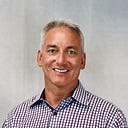Great Leaders of our History
Great leaders across history and across cultures share one tool: The words they use.

I have always been fascinated with leadership and what makes great leaders great. I will share my theories on this later in this article, but first, I want to share a couple of stories that have helped me to develop the ideas.
My team has been running workshops for almost 20 years on software product leadership. In those workshops, we have had the privilege of stewarding alignment, confidence, and commitment around product visions and roadmaps from some of the smartest business leaders at many companies, across many industries. In 2019, I began speaking to CEO groups on leadership and the use of our methodology, the Momentum Framework. It has turned into an incredibly vibrant laboratory for me to test out new concepts, content, and language on successful CEOs.
One of the exercises I run in the workshop is to ask the CEOs who they consider the greatest leader of all time. I ask them to eliminate anyone living to avoid getting into difficult debates about the political atmosphere in our country. While this is not a rigorous or scientific study, and the results are definitely biased (1,200+ CEO’s and “Key Leaders” in the United States who are successful enough to be a part of a paid peer group), they are not surprising.
These people come up in many of the meetings:
Maya Angelou
Nelson Mandela
Mother Teresa
John Fitzgerald Kennedy
Harriet Tubman
Ruth Bader Ginsberg
Martin Luther King
Mohandas Karamchand Gandhi
Abraham Lincoln
Eleanor Roosevelt
Other names come up as well, but I have chosen these for the sake of demonstration and diversity. When I ask “Why” do we consider these people to have been great leaders, I get various quips and quotes. This demonstrates something interesting. What these folks recall about these leaders, is the words they used to inspire change. These people left a mark on the world through their words. There is no doubt the actions they took themselves were in concert with their words as well, but it is the words that live on. In some cases, the leaders mentioned above were martyrs. They lost their lives or suffered greatly in support of the change they set out to create in the world. It is the quotes, sayings, and speeches, which left their immortal, indelible mark on the world. It is the words they uttered that we continue to learn from and continue to inspire the world generations later.
The most powerful tool in any leader’s toolbox is the words they purposefully employ to inspire.
In a previous article on leadership, I demonstrated graphically how leadership is defined by our ability to influence the world to cause more caring to occur for a group of people.
In the context of a business, I would define great business leadership as:
The ability to influence people to create a positive, sustainable change in the world through your business.
I use the term sustainable to represent profitability, as a business without a profit won’t last very long. I use the phrase “positive” to represent an increase in caring for and between employees, customers, and vendors. It naturally follows, if we want to be great leaders, it is imperative for us to be purposeful, specific, and clear with our words. Only if we create shared meaning through our words can we sustainably influence and inspire the people around us.
This diagram, based on this article, which describes the two fundamental attributes of leadership, I believe, explains why:

Great leaders move people up and to the right on this graph in sustainable ways through their words and their actions. They cause more caring to occur in highly influential and inspiring ways. For business leaders, we do this through our products, our services and we do it for all of our people including our employees and our customers.
Most of us are good people who are generally motivated in the ways described by the science of self-determination theory (developed by Ed Deci and Richard Ryan). I believe this deeply. We seek agency and control in our own lives. We seek growth. We seek to connect and relate to others. Ultimately, we all want to contribute to the world in some meaningful way to be connected with the people around us.
Great leaders show us how. They craft their words purposefully and clearly to connect us to the meaning in our work for each other and for our customers. They give us the gift of powerful language, which becomes the raw material, for a positive and powerful culture in healthy businesses.
We all set about to organize and categorize the world to make sense of what we see. I fundamentally believe this quote from one of the most prolific statisticians ever:
“All models are wrong, some models are useful.” — George E.P. Box
This is my attempt to make sense of leadership and to create useful tools for all of us to use.
If you found this model useful. Please clap, recommend my article or share it with your community. Most importantly, if you use it, please let me know what you learn so we can grow together.
Reading List:
The Handbook of Self Determination Theory by Ed Deci and Richard Ryan
Why We Do What We Do by Ed Deci
Leadership and the Pursuit of Happiness by Chalmers Brothers
The other authors and books which have influenced my thinking on this are numerous. To name a few:
A Theory of Human Motivation by Abraham Maslow
Maslow on Management by Abraham Maslow
Start With Why by Simon Sinek
Drive by Daniel Pink
And many, many more….
